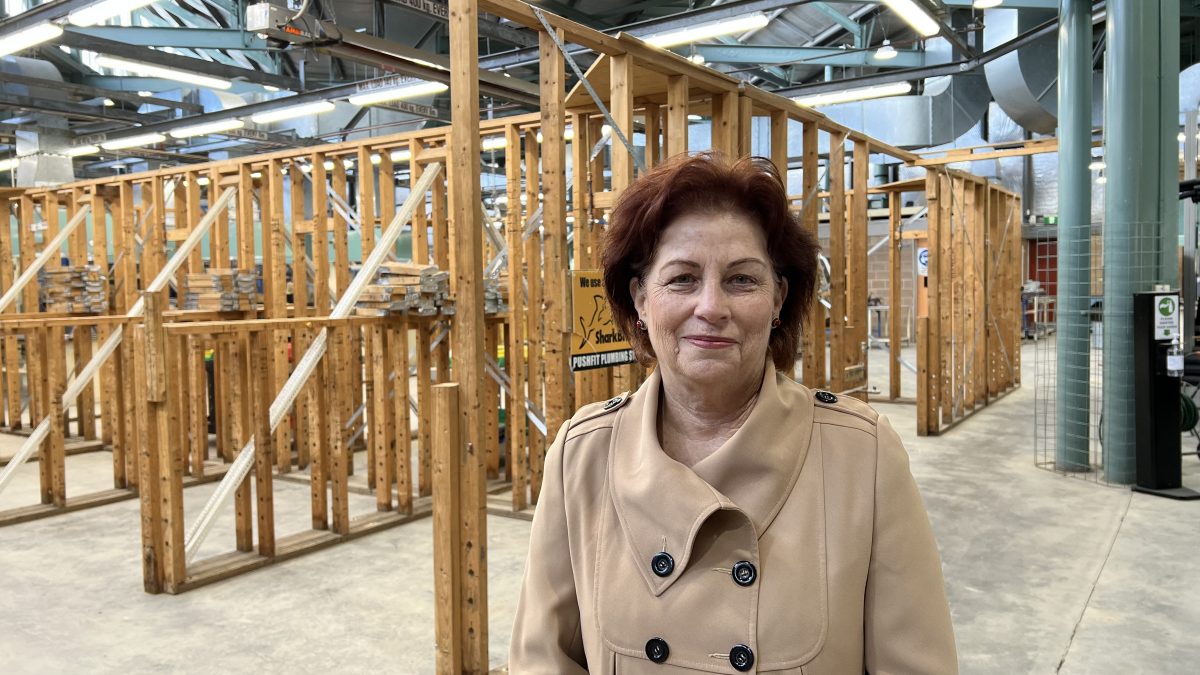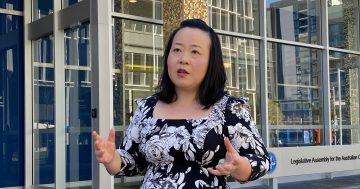
Canberra Institute of Technology’s interim CEO Christine Robertson: questions have again been raised about her visibility in Canberra. Photo: Lottie Twyford.
Rumblings have again emerged about the role of the interim boss of the Canberra Institute of Technology as it conducts consultation with staff on its direction in the wake of the contracts affair, which is now the subject of an investigation by the ACT’s anti-corruption body.
The CIT board engaged Melbourne-based Christine Robertson in August 2022 as the interim CEO, replacing Leanne Cover, who was stood down on paid leave from her $318,000-a-year job for “the duration of the inquiries and investigations” into jargon-filled contracts worth millions of dollars that were awarded to a single contractor.
Ms Cover was at the helm of the Institute as $8.5 million was paid to companies owned by “skills and complexity thinker” Patrick Hollingworth over a five-year period.
The board extended Ms Robertson’s contract in January for a further six months, but a letter from a concerned CIT teacher has questioned her role and the cost of the appointment.
The teacher said staff were upset about Ms Robertson’s apparent lack of involvement during the consultation, repeating earlier concerns about her visibility in Canberra.
“Guess who is missing once again?” the teacher said.
“The invisible acting CEO, Christine Robertson, has not held any meetings or run any sessions.
“She is also not doing any drop-in sessions and nobody tells us why.
“Staff are angry that she is still hiding from us.”
The teacher said staff wanted to know if she was even in Canberra or at home in Melbourne and how much CIT had spent on her travel and accommodation.
A CIT spokesperson said board chair Kate Lundy had expressed her full confidence in Ms Robertson and her capabilities.
The spokesperson said Ms Robertson was responsible for managing the day-to-day operations of the CIT as per her statutory requirements.
Under ACT Remuneration Tribunal Determination 4 of 2022 Full-Time Statutory Office Holders, Ms Robertson was entitled to a relocation allowance of up to $55,000, which was being used for travel and accommodation.
The spokesperson said that flexible working arrangements, as supported by the ACT Government, allowed Ms Robertson to perform this role from a range of locations.
The ongoing consultation with staff and unions about CIT’s direction included a staff conference on 30 January entitled Looking to the Future and consulting on strategies to strengthen the CIT to focus on students and staff.
The teacher said online sessions and meetings, as well as drop-ins at campuses, had been informative and the planned restructure was generally supported.
“Most staff don’t have too much of a problem with that because it looks like it will save the government money on rubbish conultants like Thinkgarden/Patrick Hollingworth,” the teacher said.
Government officials and ministers are constrained from commenting on the CIT contracts affair while the ACT Integrity Commission continues its investigations.
Ms Roberston was executive director of quality and performance at the Holmesglen Institute in Melbourne when she was appointed.
She previously held the positions of pro vice-chancellor, vocational education and training at Charles Darwin University and deputy director of vocational education at RMIT University in Victoria.


















